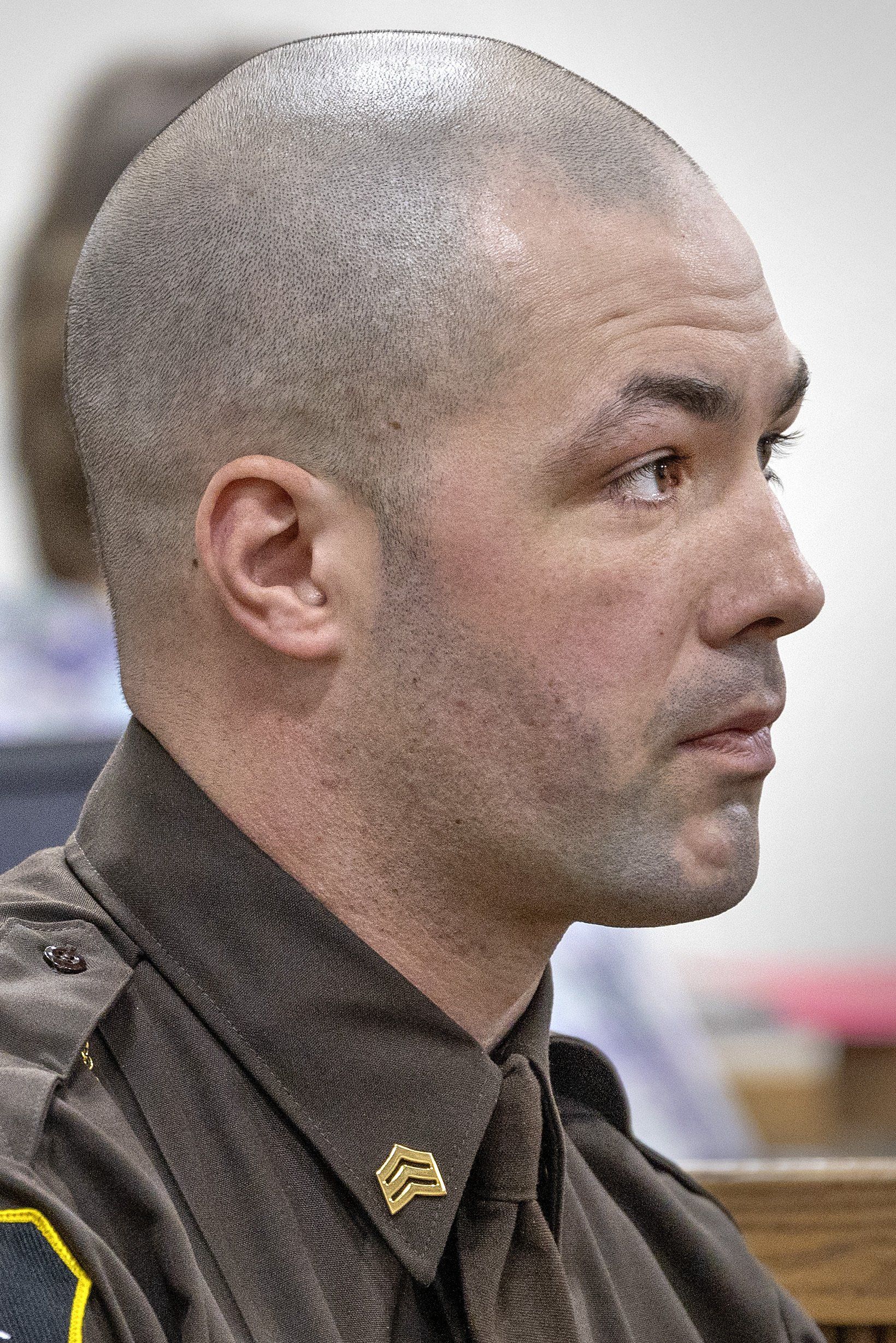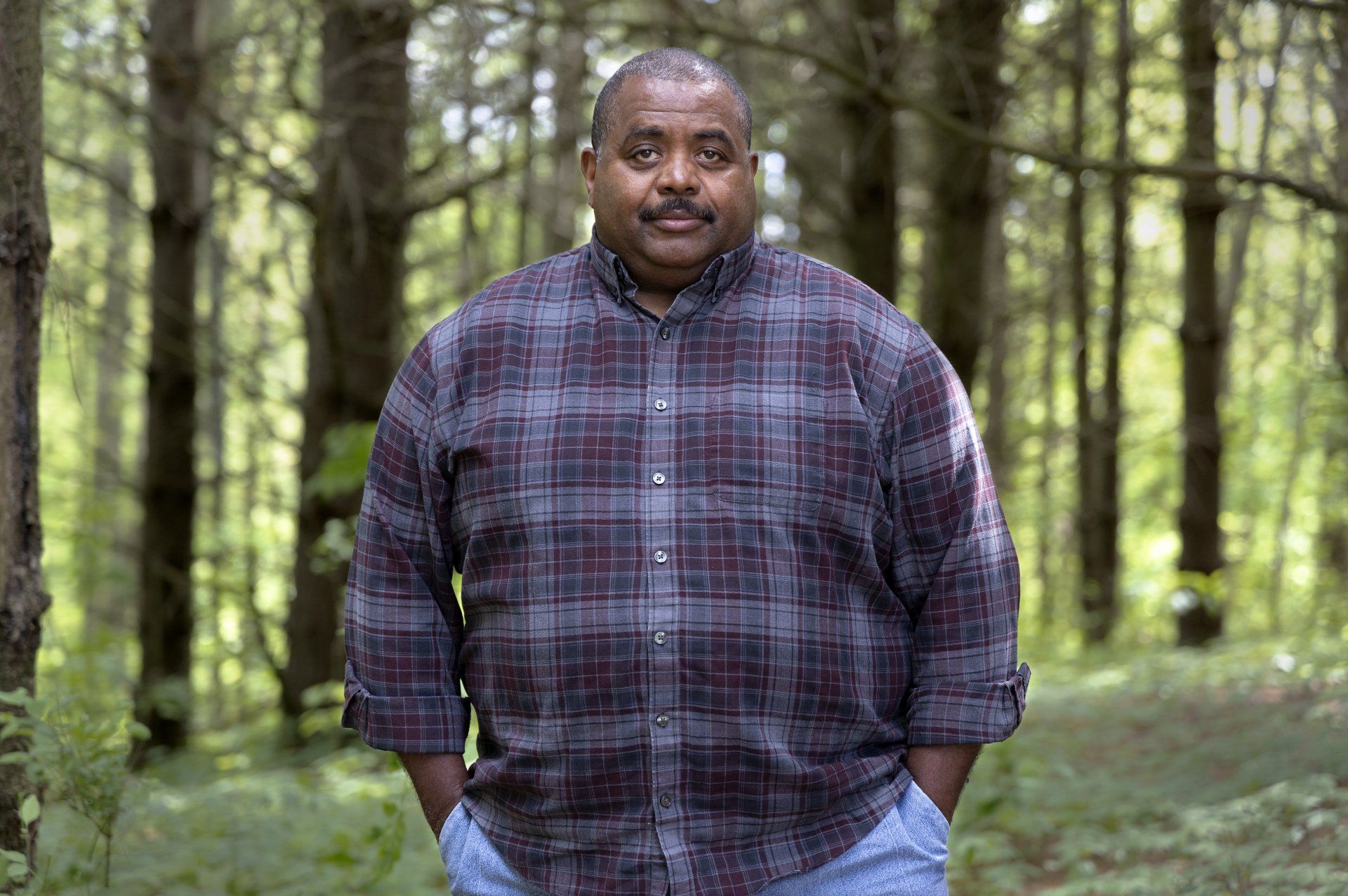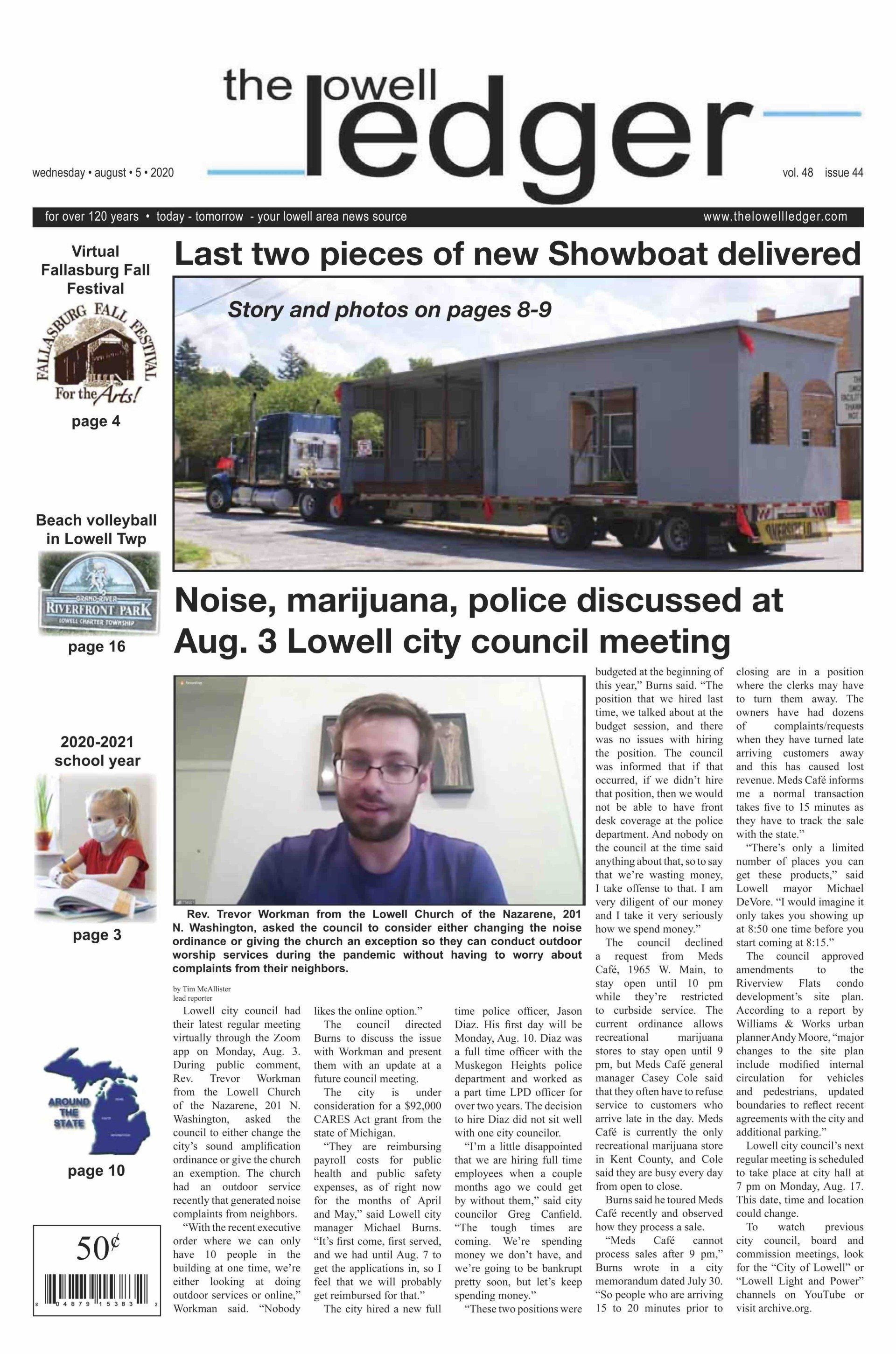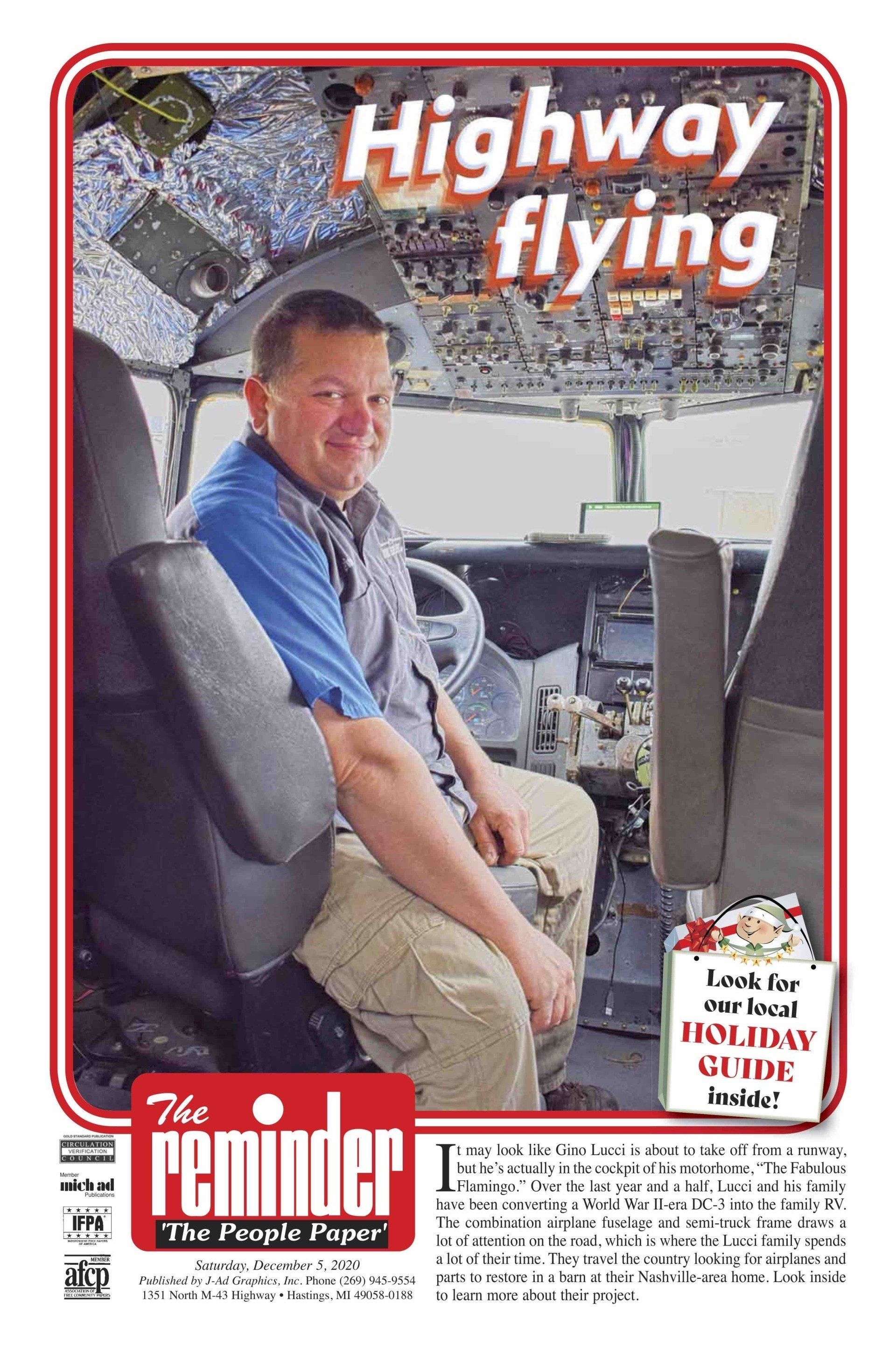Veterans seek to serve community
Rebecca Pierce • December 10, 2021
Interviews for a vacancy on the Barry County Veterans Affairs committee involved five candidates, all veterans, and a tough choice Tuesday for commissioners who could pick only one.
At the board’s committee of the whole meeting – which just happened to take place 80 years after the day 2,403 Americans lost their lives during the attack on Pearl Harbor – commissioners focused their attention on service as they questioned candidates.
The interviews wove a collective account of experience in war and peace by five men who applied for the opening: Scott Baker of Hastings, Robert Geyer of Middleville, Martin Kretovic of Woodland, Dennis Mapes of Nashville, and Mike Timmons of Bellevue. Shawn Ricketts of Hastings also applied, but was ill and unable to participate in the interview, county board Chairman Ben Geiger said.
Timmons is the incumbent chairman of the Veterans Affairs committee. His term expires this month, creating the vacancy.
By the end of Tuesday’s meeting, in a voice vote, commissioners agreed to recommend Timmons to return to the post. But they took some time to think about it.
An impressive slate of applicants made their decision difficult, several commissioners said, since they didn’t want to discourage the others from getting involved in county boards and committees.
The current committee has five members, Carla Wilson Neil, Tim McKay, Michael Spangler and Shannon Alexander Szukala.
On Jan. 24, 2017, the county board increased the committee from three to five members. It was noted Tuesday that this number could go as high as seven, although no commissioner proposed doing that.
Wilson Neil, a U.S. Air Force Vietnam War-era veteran whose four-year term on the Veterans Affairs committee started Jan. 1, spoke briefly to commissioners during the meeting’s first public comment segment: “I believe you received a letter with our comments and thoughts.
“With all due respect to everybody, and we’re very appreciative of everyone interested in serving, we would like to support the incumbent, Mike Timmons. Thank you very much. We appreciate the consideration.”
Mike Timmons
Mike Timmons was the last candidate for the position to speak to the commissioners Tuesday. His remarks, spoken slowly in his deep Texas drawl, were concise.
“My name is Mike Timmons. I was born in Texas. My wife is from Michigan. So, I live in Michigan.”
He paused as listeners laughed.
“I spent 20 years in the Navy,” he continued. “Was in ‘Nam off and on from 1964 to 1974. After about the 125th combat mission and patrol, I stopped counting them. Went to Grand Valley College and got a degree in public administration.
“While there, I was a reserve deputy sheriff in Ottawa County. I had a couple of kids, was a Scout leader, Red Cross worker, retired from the Federal Center here in Battle Creek, lay speaker for the Methodist Church, 16 years as Assyria Township supervisor.
“Generally speaking, I’ve had a good life – a lot of which is helping people. I think one of my greatest pleasures in life is having the good feeling that I get when I’m able to help somebody.
“And you can help people all different kinds of ways. I learned that starting as a deputy sheriff, through the Red Cross, through working at Salvation Army, and through being a township supervisor. People come up with all kind of problems that, if you look at them, you can give ’em help.”
Timmons said his service since 2015 on the county Veterans Affairs committee has provided him with opportunities to help veterans in many ways.
“If a veteran comes in, we can not only help him through the Michigan Veterans Trust Fund, we can help him with other facilities that the county has available.”
Scams often prey on veterans, he noted.
“One of the things we have to be alert to is some folks like to get stuff that they really don’t rate. And sometimes it’s hard to tell what it is you have before you, when you’re looking at the paper and you have to sort of read between the lines … I’ve enjoyed being able to do that. I think I’ve done it well. I’d like to continue doing it. It’s as simple as this.”
Commissioner Bruce Campbell praised Timmons’ work, saying, “Thank you for your service, not only to the military, but to the community. You’ve done amazing things, always contributing. …Your feelings and mine are exactly the same. Nothing makes you feel better than to improve the quality of life and helping other people. I appreciate that, Mike.”
Commissioner Jon Smelker added that he’s known Timmons since Smelker became a county commissioner.
“One of your best traits is listening; you do it well,” Smelker said.
Geiger recalled that, at one of the first municipal meetings he ever attended, in Assyria Township, “the crowd got a little rowdy.”
That’s when Supervisor Timmons took the situation in hand, he said, mimicking Timmons’ Texas drawl, “‘Boy, I’ve heard about enough of you.’”
Geiger paused, then emphasized Timmons hadn’t been speaking to him.
“It wasn’t me,” he insisted, adding, “I’d still be worried if it was.”
Turning back to Timmons, Geiger said, “You’ve given a lot of time to your country and this county, and we want to find a way to keep you involved.”
The board didn’t take a voice vote until later in the meeting.
But the interviews were the third item on a lengthy agenda, beginning with Baker, who said he was an 18-year-old kid when he joined the U.S. Air Force.
Scott Baker
“I served 27 years-plus … went through basic training, then out to work on F-16s. It taught me great skills, how to lead.”
Baker said he spent 12 years as a commissioned officer, managing fleets of planes and people.
“I have led aircraft maintenance organizations of 300-plus personnel and 31 aircraft and was responsible for aircraft maintenance training,” he wrote in his application. “I have experience leading joint services as well.
“I have been a member of the United States Air Force ‘Thunderbirds’ and have deployed around the world supporting military and humanitarian missions. I have deployed in support of combat operations in Afghanistan and Saudi Arabia.”
Baker, who lives in Baltimore Township, moved to Barry County in 2016. He works full-time now as customer order and fulfillment manager with GE Aviation.
He said he was looking for ways to give back when he noticed this opportunity.
After Baker’s presentation, Geiger went around the table, letting commissioners ask any questions.
“Hi Scott,” Campbell, a Vietnam War-era veteran, said, telling Baker he didn’t know who would be picked to fill the vacancy, but that there were other opportunities for public service.
“There are many other boards in our county; I became aware of that when I became a commissioner,” Campbell said. “Keep that in mind. [I] really appreciate your coming in.”
Robert Geyer
Geyer, who currently is serving on a county task force to recommend projects that qualify for American Rescue Plan Act funds, a retired Certified Public Accountant and former partner with Crowe LLP, a top 10 accounting/consulting firm, said he was born and raised in Wabash, Ind., which is about the same size as Barry County.
“I graduated from Purdue University and decided that someday I might want to own my own business,” he said. “I went on to Indiana University to get my master’s when I was drafted.”
That was during the Vietnam War.
“I asked the draft board if I could finish the semester, since I had already applied and paid for it. They said, ‘Nope.’ So, I went down and enlisted for officers’ candidate school.”
Geyer trained as a combat engineer and, because he ended up in the top 10 percent, he could choose his branch. “I chose to get out of combat,” he said.
He became an adjutant general.
“I got my orders for Vietnam, two hours after my daughter was born. I went through a number of interviews. A colonel interviewed me, and he asked me if I could write.”
He got the job. It was called “Chief of Special Actions.”
Everything in combat came under that responsibility, Geyer said. He was responsible for awards and decorations; he wrote the citations.
“Commanders from all over the country would call me up, saying, ‘Hey, a guy did this. What do you think he’d be good at – or could get good at?’”
Another area of expertise for him was congressional inquiries.
“I received about 45 congressional inquiries a month,” he recalled.
These were questions posed by congressmen, senators or even the president of the United States; and it could be provoked by just about anything.
An example Geyer gave was that somebody complained about a meal.
“One guy in jail said: ‘I was in an 8-by-8 [foot] cell, and the food was awful.’ So, I went to the jail and it wasn’t 8-by-8, it was 6-by- 8 – and the food was awful. And that’s how I responded to the congressman.”
Geyer and his team had two weeks to respond to an inquiry from a congressman, one week to reply to a senator and three days to reply to the president.
In the process of their inquiry, they had to get the facts.
Geiger asked if he had ever responded to a presidential inquiry.
“Yes, I did. We had a captain who committed suicide. Four or five hours before he committed suicide, he wrote a letter to his mother saying that he was getting his first company command the next day and how excited he was. And then, at 4 o’clock in the morning, he committed suicide. We didn’t know anything about the first letter.”
“I did all the casualty reporting,” Geyer recalled. “It was my responsibility to write the letter for the commanding general of the brigade to the next of kin. For that, they wanted us to get a full history, so I could be empathetic, know what their background was, and how they died and explain that to the next of kin.
“In that particular case, I wrote it up. … No question it was suicide. I wrote the letter, it was sent off. Within about a week, all of a sudden, we had a little ticker thing there and we got [inquiries from] four congressmen, two senators and a presidential – all on that one [case].
“So as soon I got those, I called command headquarters. He said, ‘This is bigger than both of us.” We got the inspector general’s office. And they sent over a colonel to investigate.”
Their findings were the same.
What Geyer said he found most difficult in this work is that “War, to me, is personal.”
“When I came back [home], it was very hard for me to ever see a war movie because everybody who was killed in war movies was people.”
One of the interesting aspects most people didn’t realize is that, by 1971, when he was there, he said, the Vietnam War was winding down.
“We had no combat casualties,” he said. “They were either accidents, drug overdoses, suicides or murders. And those were the [letters] I had to write to kin. That gave me a very personal interest in those.
“And, when you came back from Vietnam, you were not treated all that well, but you keep in touch with your buddies and build them up.”
As the commissioners went around the table and thanked him for his service, Campbell greeted him by name: “Morning, Robert. I would just like to say thank you for your service. I have an inkling of what you dealt with in your life and appreciate it very much.”
Martin Kretovic
Kretovic, born and raised in Rochester, N.Y., is a Cornell University graduate with a bachelor of science degree in agriculture who had served as a county agent there for a while before being drafted into the Army in 1968.
“I was in in Vietnam from 1969 to 1970,” he told commissioners. “I went over there in the infantry. To my good fortune, they put me in the construction engineers at the time. They asked me if I could type. I said, ‘Yes,’ I could type, which I learned in seventh grade. I ended up being company clerk at the end of my tour there. I was very fortunate that I didn’t have to go in the infantry.”
After the service, he visited Michigan to see another veteran he had served with and decided to stay here. He owned a dairy farm for 10 years and worked for a grain and feed elevator for the past 20 years before retiring in 2015.
He volunteers at MacKenzie’s Animal Sanctuary near Lake Odessa.
“I walk dogs there,” he said. “That helps me get over having a pet.”
He also drove for American Red Cross and Hope Network, transporting veterans around to different appointments. “I enjoyed that, where I could be one-on-one with another veteran who had some problems, either medically or mentally.”
“So, when this came along. I figured, ‘I’m in good health, it’s been 50 years since I’ve been in the service. It’s time to do something else to help other veterans in the area … less-fortunate than me.’
“Thank you very much for your service,” said Smelker, a veteran who was stationed in Korea during the Vietnam War. “… I do want to say that you being company clerk, in our company, our company clerk ran the company and made sure everything went well. I know there’s commanders there, but the clerk made sure everything went right.”
Kretovic confirmed, “They gave me the Army Commendation Medal for service at the end of my tour.”
“Thank you. You must have done a good job.” Smelker replied.
“I too want to thank you, first of all, for your service,” Campbell told Kretovic. “It sounds like you were in (the) country about same time as I was. Even though you didn’t get on the battlefield, I think everyone should be aware that you were willing to do whatever it took. And I thank you very much for that.”
Dennis Mapes
Mapes said he lives in Assyria Township on a farm that has been in his family more than 100 years. He grew up in Battle Creek and spent summers on Thornapple Lake.
He enlisted in the Navy in 1967 and served during the Vietnam War, when he participated in search-and-rescue duty in the Gulf of Tonkin – most of the time off North Vietnam.
“In cases where pilots ejected, we would pick them up,” he said.
They stood watch and had the opportunity to visit ports to refuel and replenish supplies.
“After coming back from Vietnam, I was sent to Washington, D.C., to work at the Pentagon for the office of the Chief of Naval Operations for two years,” he recalled. “When I got out of the Navy, a recruiter kept calling me, calling me. Finally, I had the urge and took the call. I enlisted in the reserves. I stayed on active duty on reserve time about 25 years.”
In the reserves, he was with a NATO unit, doing exercises in Europe, particularly at their headquarters in Brussels.
His next active-duty stint came in 2006 when he was sent to Kuwait and Iraq for Operation Iraqi Freedom.
“That was my windsong,” Mapes told commissioners. “I was glad I did it. So, I retired from the Navy.”
After that, he had a civilian job, working for 43 years for the Kellogg Co. and retiring from there.
Now he is the commander of VFW Post 8260 in Nashville.
“We’re a struggling organization. Younger veterans don’t want to join.”
So, they’re working hard to reach out to veterans.
“So many people out there that want to take advantage of vets,” he remarked. “It’s just great to be able to help people.”
Smelker thanked him for keeping the post going.
“Thank you for, really, a lifetime of service,” Commissioner Catherine Getty said. “It sounds like an impressive assortment of ways you’ve figured out to serve your country and community.”
Mapes is a past trustee and village president for Nashville and also is active in his church.
“Thank you, Denny,” Geiger told him, “I had no idea you had such a rich background, and it took you overseas. We appreciate your service.”
“It was an opportunity, and it was on the government’s dime,” Mapes replied. “And I’m glad that I had the opportunity to see as much as I did. It makes you appreciate what we have.”

A new court date has been set for a 24-year-old Battle Creek man accused of threatening campers at the Welcome Woods campground in Carlton Township last month. Trevor Dean Leiter is scheduled to appear for a probable-cause conference June 15 in District Court 56B. A conference had been scheduled for last week but was adjourned, court officials said. Leiter is charged with three counts of felonious assault and one count of reckless use of a weapon in connection with the May 16 incident at the campground on Welcome Road, north of the city of Hastings. Michigan State Police received a report of a domestic dispute involving the suspect and his girlfriend. Prior to troopers arriving, Leiter threatened people at the campground and started “shooting rounds into the air from a handgun he had pulled out of a backpack,” the Barry County Sheriff’s Department reported. When troopers arrived, Leiter initially refused to exit the RV, and officers surrounded the vehicle. The Barry County Sheriff’s Department Special Response Team was called to assist. “Members of the SRT were able to quickly control of Leiter and handcuff him to the rear [of the RV],” the sheriff’s department report said. “After standing him up and trying to escort him to a patrol vehicle, he began resisting. Leiter had to be pushed towards the patrol vehicles. Leiter became more resistant and had to be brought down to the ground and held down.” Once in the patrol vehicle, Leiter kicked at the windows in the vehicle. Then at the jail, Leiter continued to resist corrections officers and had to be placed in a restraint chair, according to the sheriff’s department report. The girlfriend escaped without injury, and no one else was hurt in the incident. Leiter is being held on a $10,000 bond in the Barry County Jail.

Sgt. Scott Ware with the Barry County Sheriff’s Department received the 2022 Police Officer of the Year Award for his actions during an Aug. 4, 2021, car chase and shootout in Woodland. Ware was recognized by the Police Officers Association of Michigan at its annual convention in Grand Rapids. “For bravely putting the lives of others before his own by stopping an armed shooter before he could do any real harm, Sgt. Scott Ware is one of the Police Officer of the Year award recipients,” a press release reads. “The teamwork of all officers on the scene and the courageous, tactical decisions of Sgt. Ware allowed the whole incident to end without any civilian or police officer casualties.” Undersheriff Jason Sixberry said the department is lucky to have Ware. “Scott’s done a great job here and with everything he’s done to keep the community safe,” Sixberry said. “We’re proud of him and his accomplishments and him receiving the award. It’s a pleasure of ours to have him go from a deputy up to a sergeant position, being able to instill his good values and hard work ethic in the department.” The encounter started when police were alerted that Timothy Riddle was suspected of stealing two shotguns from a Hastings resident on the 1000 block of North Coville Road. Police in the area were notified to keep a lookout for Riddle. A Hastings City Police officer saw Riddle’s vehicle at a gas station on M-43 in Hastings at 6:48 p.m. that night. Riddle was stopped by police as he was leaving the station. When police started to question Riddle, he grew agitated and sped off, heading north on M-43. Police reports and testimony in court said Riddle reached speeds as high as 115 mph. Officers from the city police and the sheriff’s department, including Ware, joined the chase. Police reported that Riddle pointed a shotgun out the window at pursuing officers throughout the chase. The chase ended at the Mobil gas station parking lot on M-43, east of Woodland. Police reported that Riddle leveled a shotgun at officers after exiting his vehicle and began approaching them. Ware, who was still inside his police cruiser, readied a rifle and fired several shots through the windshield of his vehicle. Those actions are credited with causing Riddle to stop shooting and retreat into the gas station. One customer escaped and two employees hid inside the store. They later were able to leave the station unharmed, police report. Riddle barricaded himself inside the station for seven hours while police negotiated with him. The standoff ended at 1:30 a.m. when Riddle surrendered himself to police. He was later convicted of 21 criminal counts. During Riddle's trial, Barry County Judge Michael Schipper reviewed the incidents as they had occurred that day. Remarkably, the judge pointed out, no one was hurt. That was because of the police officers who responded to the scene, he said. And Ware was a key reason for that, according to the police officers association.

Despite a near 90-degree forecast, a strong breeze from the south kept participants and spectators comfortable as the annual Memorial Day parade wound through Hastings Monday morning. The event, hosted by Lawrence J. Bauer American Legion Post 45, made its traditional stops, pausing at Tyden Park and the bridge over the Thornapple River before ending at Riverside Cemetery. The parade stepped off at 9:30 a.m. from the intersection of Boltwood and State streets, with the Legion’s color guard, followed by the honor guard, Legion members and other veterans, National Guard and Reservists, Legion Auxiliary, Legion Riders, the local Disabled American Veterans chapter members, Sons of the American Legion, Scouts, Hastings Area Schools Marching Band and other participants. They walked through downtown, making their way to the Veterans Memorial at Tyden Park, where attendees heard a speech from Steve Carr, an Air Force veteran. Carr served as the commander of Post 45 for three years before taking over as the current Michigan District 4 forward commander. He began his speech by honoring the final 13 U.S. service members who lost their lives in Afghanistan. He shared a little bit about each person – their names, where they came from and details about their lives. “Not only are these diverse men and women forever in our hearts, but for those who knew him, they are forever young,” he said. “They came from every background, yet they shared a common goal: To serve America and make life better for others.” Carr went on to highlight the importance of Memorial Day. “Memorial is not about picnics and parades, though there is nothing wrong with enjoying and celebrating our American way of life,” he said. “Memorial Day is about gratitude and remembrance. It is about honoring the men and women who made it possible for us to gather here today in peace. But the reason there is a Memorial Day, the reason we gather here, is to remember who made our way of life possible. They truly are the guardians of our freedom.” Following Carr’s speech, two wreaths were placed at the memorial. One wreath honored all veterans and the other honored prisoners of war and those still missing in action. The group then made its way to the bridge on Broadway, where a wreath was tossed in Thornapple River to honor those who have served or are serving at sea. Both stops included a rifle salute by the Post 45 honor guard, followed by playing of taps by two Hastings High School band members. The parade then moved to Riverside Cemetery where a brief ceremony took place, as it has for many years, near the Grand Army of the Republic marker, beyond the Avenue of Flags. Those 43 flags, Jim Atkinson pointed out, were donated by the families of 43 veterans, who were presented the flags at the time of the veteran’s death. Throughout the large cemetery, Atkinson said, another 500 or so small U.S. flags mark the graves of veterans buried at Riverside. As in the past, local Scout groups helped place the flags in recent weeks. Youngsters and adult volunteers finished the work in about an hour and a half, a grateful Atkinson said. Unlike in years past, a wreath was not placed on the grave of the most recently deceased veteran at Riverside. Dr. Paul Sweetland, who served in the U.S. Army’s 82nd Airborne during the Vietnam War, died in early March. Atkinson said full military honors were conducted during Sweetland’s burial just a few weeks ago. So, the wreath placed at the GAR marker was the final wreath placed Monday. Barry Wood, recent commander of the state American Legion and a Hastings resident, spoke for a few minutes. Like Carr, Wood reminded people of the purpose of Memorial Day. “This is the day we pay homage to all those who served in the military and did not come home. This is not Veterans Day. This is not a day for celebration. It’s a day for solemn contemplation over the cost for our freedom. “Memorial Day was born of necessity. After the American Civil War, a battered United States was faced with the task of burying and honoring the 600,000 to 800,000 Union and Confederate soldiers who had died in the single bloodiest military conflict in American history. “The first national commemoration of Memorial Day was held at Arlington National Cemetery on May 30, 1868, where both Union and Confederate soldiers are buried. “Every veteran takes this oath,” Wood continued. “The ones we honor here today make the ultimate sacrifice while carrying out this oath. “Veterans, you will remember this, and I quote: ‘I do solemnly swear that I will support and defend the Constitution of the United States against all enemies, foreign and domestic; that I will bear true faith and allegiance to the same; and that I will obey the orders of the president of the United States and the orders of the officers appointed over me, according to regulations and the Uniform Code of Military Justice, so help me, God.’ “We here today thank and honor those veterans who took this oath and cannot be here. Each veteran here, and those across this nation, understand what taking this oath means. It is a gift, or a pledge, of their lives to you and to all in the United States of America. That oath is a major part of who we are in the military. It forms the bedrock of what we stand for and … are willing to fight for. “Some of you may know a soldier, airman, sailor or marine who did not come home: “I am an airman. I do not choose the time or place. Convenience is not in my vocabulary. “I’m a soldier. I stand at the ready. When my orders come, I go. “I’m a sailor. The job I’m given to do, I do. Even if it costs me my life, I will do it. “I am a marine. Yes, take me home, but only when the job is done, only when the job is done. “I pray for each family that has lost a veteran, never having a chance to say ‘good-bye.’ “Let us never forget,” Wood concluded.

They told him Black people didn’t live in Barry County, but Darryl Newton didn’t care. One day in 1997, his wife, lost in the backroads of Barry County, stumbled on a house. It sat at the end of a dead-end gravel road surrounded by woods. She called him right away. She told him she had found their house. Despite warnings about Barry County from his coworkers at Meijer in Grand Rapids, Newton has lived in Barry County for 25 years. He refers to the county as “Barry,” as if it’s a longtime friend. He cherishes the peace, the quiet and the fact that he doesn’t feel pressure to always lock his doors. It’s where he has raised his kids, sent them to school and, as a self-described “football nut,” logged nearly two decades as a football coach. For five years, he volunteered with the Hastings youth football program, spending every Saturday, 8 a.m. to 8 p.m., coaching, announcing and serving up food. People still know him as the “pickle guy” because he stocked the snack stand with this fan favorite. Later, he would coach football in Middleville for 12 years, serving as both the president and vice president of the youth league. “It's a great community. I’ve loved living here, it’s just...” he said, pausing and sighing, “you have to get used to it.” Darryl Newton is a 59-year-old man from Ypsilanti who cheers for the Philadelphia 76ers, likes to hunt, loves to grill, served in the military, goes to church and lives in Barry County as a Black person. He could work in Barry County and live in Grand Rapids, Lansing, Battle Creek or Kalamazoo. Each has a larger Black community, but he chooses to live in Barry County, which is 96.6 percent white and 0.7 percent Black. Hastings is just 0.1 percent Black. The Hastings Banner spent more than a month with Black residents in the community to learn more about their daily experiences in Barry County. Many said they enjoy living here and, for the most part, people in the community treat their families with kindness and decency. But many admitted to feeling like outsiders. All have experienced some form of racism. There’s one memory that sticks with Newton. A few weeks after arriving in Barry County, Newton’s son came home with bumps and bruises. As he had walked in Hastings, a few kids picked a fight with him. They called him a racial slur typically directed at Black people. But Newton wasn’t surprised. “This is normal, it's going to happen,” he told his wife, “and it's going to happen to him again. And again.” Growing up in Barry County Isaac Schipper was the only Black student in his grade from first grade to high school graduation at Thornapple Kellogg Schools. And everyone knew it. “Oh, that's Isaac,” other students would say when new people visited the school, “you'll recognize him right away. He sticks out.” “That's just a fact of living out here,” Schipper said. “Black people stick out like a sore thumb.” Schipper, 29, was adopted by white parents. His father is Barry County Judge Michael Schipper. Isaac identifies as bi-racial, with white and Black biological parents, although he said most people see him as Black. He graduated from Thornapple Kellogg in 2011, where he was a lineman on the 2010 all-conference football champion team. He attended Grand Valley State University and studied psychology – a result of “years of watching ‘Scrubs,’” he said. He spent a few years working in a hospice facility, but the experience left him burnt out and he started to think about a new career. In 2017, he took a job working in cafeterias in the Grand Rapids Public Schools and, in 2018, enrolled at Ferris State University to pursue a teaching degree. Before leaving Barry County, Schipper never really spent much time around other Black people. “There's not really any kind of Black culture out here is the best way to put it,” Schipper said. That changed when he moved away from Barry County. Going to college, working in Holland and living in downtown Grand Rapids made him more aware of the experiences of other people of color. But Schipper said he has never felt unsafe or threatened in Barry County. “There haven’t been a whole lot of racial encounters,” he said. He would recommend Black people live in Barry County. Schipper continues to live in Barry County while he works as a substitute teacher at Thornapple Kellogg. After finishing his degrees, he wants to return there permanently to teach in his childhood district, hopefully in fourth or fifth grade. Still, there’s one instance of racism that Schipper remembers: When he tried to date a girl. They started by flirting in gym class. They became close and Schipper visited her house, where her father watched his every move. Eventually, Schipper asked her to date. But she made excuse after excuse. After a while, she told him the truth – her father “didn’t feel comfortable” with them dating because of his skin color. Over the following year, her father became more comfortable with Schipper, but it was a revealing moment for him. “No one's going to say, ‘Oh, I'm against diversity,’ until it affects their lives personally,” he said. Blending in From the age 7 to 17, Vincente Relf Jr. never lived in a place for more than two years. Financial troubles, family disagreements or a change in jobs -- something always caused his family to relocate. He bounced around from Detroit to Southfield to Dearborn, even living in a shelter for a short period of time. In each place, he had to learn how to fit in. Relf, 26, calls himself a “chameleon.” “My whole life story is blending in, dude,” he said. A few weeks into his junior year of high school, Relf packed his life into five Kroger tubs and moved in with his sister in Grandville, a suburban community near Grand Rapids. Grandville required a different type of blending in. In Dearborn, his school was split almost evenly between white, Black and Arab students. In Grandville, he said there were maybe 20 Black people in the entire district and not many other people of color either. He felt the lack of diversity from the moment he arrived. People assumed he knew how to break into cars. One classmate said that she didn’t understand him because she “didn’t speak Black.” But Relf wanted to fit in. “I wanted to feel like I belonged because I live here now,” he said. “This is my home. I have to find a way of belonging. People are more accepting when you talk like them, sound like them, look like them, right?” Relf threw away his old clothes. When he walked home from school, he practiced speaking without slang. Relf said it gets exhausting, having to constantly code switch and change. But he said he “had to adapt to survive.” “I wanted to give people that different experience and I knew that when people saw me, if I talked the way that I talked, they were immediately going to categorize me as the Black guy they see on the news that has committed this crime,” he said. In 2018, Relf graduated from Davenport University with a degree in business management. Looking to buy a house and build some equity, he stumbled onto a place in Middleville with a big lot and the perfect amount of natural light. In September 2020, he made Middleville his home. In the back of his head, he wondered if he would find racial epithets scrawled on the front of his house. Within weeks, though, he felt more welcome. A local basketball coach invited him to play pick-up. Unprompted, a neighbor who looked like Santa Claus would plow his driveway after it snowed. Relf calls a different neighbor “the greatest guy ever.” Occasionally he’ll get the “oh, crap, there’s a Black guy in Middleville stare.” But he said that he “loves living in the country.” He loves the quiet, abundant space and having a home to call his own. When Relf calls his family in Detroit, he doesn’t think about how he speaks. But as he walks in Middleville, Relf said he is always conscious of how people see him as a Black man. “I'm always Black,” Relf said. “I will always be Black. I'm always aware that I'm Black. I don’t know, it’s just something I’m always aware of. I’m never not Black.” For the most part, Relf sticks to himself in Barry County. When he wants to do something fun, he heads to the Grand Rapids area. The summer concerts and downtown events here don’t appeal to him, and when he looks around, he sees no one who looks like him. “I feel like there's a community,” he said. “I just don't know if I feel a part of the Middleville community.” ‘Just wading in the water’ At church this past weekend, they shared petitions for prayer. As Desiree Holley-Sancimino sat in her pew, she couldn’t help but think about the Buffalo grocery store, where 10 Black people were murdered May 14 by a gunman under the sway of white supremacist ideologies. “The climb is very hard,” she said. “I cry out to the Lord, when is it going to end? Then we got this shooting in Buffalo now. This guy comes 200 miles away, he's checking out the climate, what people are shopping at the store and then sets up to murder people just because they're of a different color.” The prayer petitions asked for “hate to stop in the country.” They mentioned Ukraine. But none directly discussed the heinous shooting in Buffalo. Holley-Sancimino was disappointed. “We have to acknowledge that it exists,” she said. “We can't push it aside or use vague language.” Holley-Sancimino, 69, has witnessed and experienced racism during her entire life. Her great-great-great-grandfather woke up one morning in Mississippi to a burning cross on his front yard. After Holley’s grandparents came to Detroit, Holley-Sancimino’s mother was denied a job because her skin was “too dark.” Her brother was later bussed to a new school and told to “go back to Africa.” Holley-Sancimino has continued to deal with racism, even in Hastings. In the fall of 2021, her 11-year-old granddaughter was called a “dirty girl” as she stood on a sidewalk downtown. Holley-Sancimino called moving to Hastings a “culture shock.” She was born in the 1950s in Detroit, where she lived with Black, Italian, Lebanese, Polish, Asian and Mexican people. Diversity, she said, is the “spice of life.” “I've always loved diversity,” she said. “You gain so much when you live with people that are different from you and learn about their experience and where they came from, eating their food.” She lived in Detroit until she was 48. Then she bounced around between Athens, Ala., Atlanta, Denver and Detroit. She reconnected with a friend at a high school reunion and that friend became her husband. In 2019, Holley moved to Hastings to live with him. Since settling in Hastings, she has found comfort in her friendship with “five lovely ladies” and events like the Thornapple Arts Council Jazz Festival. Every Sunday, she sings in her choir. Holley-Sancimino wants to be a voice for change in Hastings. She shared the incident with her granddaughter in a letter to the editor to The Hastings Banner. During the summer of 2020, she spoke at an event for racial equity in downtown Hastings. She stresses the need for more diverse representation in schools and on the city council, and she has called on ministers to speak more about race from the pulpit. She participates in a regular community dialogue called “Roundtable Companions for Racial Equity” at Emmanuel Episcopal Church where they read books, talk about race and share “lots of tears.” Holley-Sancimino doesn’t want to hide. During an interview, she wore a hat that reads “Black Barbie” in pink, bedazzled letters. She likes to put on her Black Lives Matter shirt. “I don't care,” she said multiple times. Walking around town, Holley-Sancimino said she doesn’t feel unsafe. But she doesn’t always feel welcome or at ease either. That is especially true at community events, where a lot of people gather, but few of them are Black. “I'm just wading in the water,” she said. Whenever she sees a Black person, she stops them – on their porch, in the B2 Outlet Store or wherever she finds them. “We just talk, you know?” she said. “Not that we’re gonna agree on everything. But you got somebody that looks like you.” ‘So much pressure’ When Kenneth Jefferson enters a store, he runs through a mental checklist. No hoodie, no hands in his pockets. He says please and thank you, he always holds the door and he never, ever raises his voice. “100 percent manners everywhere I go,” he said. Black people, he said, “don't get a lot of chances,” and he is always cognizant of how he looks, talks and acts. He never wants to be seen as threatening. Sometimes Jefferson, 46, wishes he could read people’s minds. He wishes he could know what they are thinking when he cheers at a basketball game or passes them in a store. He wishes he could know how they perceive him and what makes them nervous when he is around. “I care. I shouldn't but I care,” he said. “I want to make everybody happy. I want to make everybody comfortable, which you can't. But I’m that person. I've always been a pleaser. One person uncomfortable makes me uncomfortable.” At the age of 4, Jefferson moved from Detroit to a 40-acre farm in Allegan, where his family was one of few Black people. They had an acre-and-a-half garden, cows, chickens and 800-pound pigs, the largest in the county at the time. Still, they had little money. Occasionally, their water or electricity got shut off and they had to boil snow for water or turn on the stove for heat. Jefferson would go on to graduate from college – the first in his family. As a young adult, he dabbled in modeling. He has worked as a coordinate-measuring machine operator and a junior quality engineer at an engineering plant. Later, he served as a radiological technologist for Spectrum Health. In 2010, Jefferson moved to Barry County. Twelve years later, he still doesn’t feel comfortable. “It wasn’t as scary as it is now,” he said 12 years later. He recalls being stopped by a state police officer while running in his neighborhood. Another time, cops were called to the high school when he was playing basketball with friends, some Black. In the Walmart parking lot, a person rolled down their car window and aimed a finger gun at him. The person, Jefferson later realized, lived down the road from him. Then, there are the everyday moments that make Jefferson feel like an outsider. The mental checklist he runs through when he walks outside. The overwhelming stares he receives when he walks into a store or a restaurant or a golf outing. “So much pressure,” he said, his voice quivering and exasperated. But Jefferson doesn’t plan to leave Barry County. This is where he has built a life for himself, where he plays basketball, golfs and fishes. During COVID, he built a green room in his garage, growing bell peppers, jalapenos, chili peppers, basil, strawberries, lettuce and onions. He wants to share with people in Barry County what it is like to be Black. Really, though, Jefferson doesn’t think his experience would be different anywhere else. This is just his reality of being Black in America. “I don't have anywhere else I would want to go. There's no city that, like, ‘Oh, I'm gonna go here and have a better life.’ … I think that, um,” he said, pausing to think, “yeah, I know, and that's a weird answer. I don't think anywhere else will change. That's who I'm supposed to be, just being a Black person.” What needs to change? As he waited to pick up his kids at St. Rose Elementary School, a little girl sprinted toward Darryl Newton, the former youth football coach who has lived in Barry County for 25 years. “I know you, I know you,” she said, with the biggest and brightest eyes. “I looked at her and said, ‘Well, how do you know me, honey?’” Newton remembered. “You’re Nick’s Black daddy,” she said. Heads turned. Parents rushed over. Everyone yelled, “Shush!” But Newton told them to stop. He saw a teaching opportunity. “Don’t correct her,” he said. “She’s talking about what she sees. Here's the point: I am Nick's daddy, and I am Black. And the minute you tell this young lady that ‘shhh, don't call him Black,’ then what you're saying is there's something wrong with him being Black.” “…Don't ever shush that because you're gonna say that something's wrong with me. And there's nothing wrong with me. “I always found in Barry County – if you don't get yourself riled up – that there's an opportunity to educate.” Newton’s schoolyard encounter underscores what other Black residents in Barry County said: Race and, more specifically, the experiences of Black people, are rarely discussed outside of their own homes. Some people are trying to create that public conversation. The Barry County Chamber of Commerce and Economic Development Alliance and Leadership Barry County, for example, created a program called “Courageous Conversations,” designed to discuss diversity issues. They are focused on creating videos with more diverse representation and developing a cohort called the “Flourish Group” for people who do not feel like they belong in Barry County. “It's very much on the forefront of all of our minds that we're trying to make Barry County more inclusive,” Chamber President/CEO Jennifer Heinzman said. As a learning and development specialist with Meijer Inc., Newton focused on teaching diversity for employees. He said that Barry County needs action related to racial equity, such as increased diversity on school boards. But, at the bare minimum, Newton believes change begins with more discussion. It begins with more public effort to learn from and acknowledge the experiences, bad and good, of Black people. It requires a thoughtful investigation into why Barry County looks the way it does, Newton said. Why a place so close to Grand Rapids, the second biggest city in the state, has a Black population of just 0.7 percent. “It's seeing what's not there that's more important,” he said. “And then ask yourself, but why? Why is that not there? And what are we missing from not having that there?”









